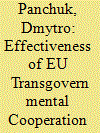| Srl | Item |
| 1 |
ID:
165339


|
|
|
|
|
| Summary/Abstract |
In recent years the phenomenon of populism has inspired many debates and many doubts. Despite the growing scholarly interest, it still means different things to different researchers. In the first part of the article the author briefly presents the issues related to the phenomenon of populism itself and its relationship with democracy, and examines the creation of parties that researchers label populist. The second part is a case study that analyses the sources of populism, its manifestations and its importance in Serbia and Croatia over the last century.
|
|
|
|
|
|
|
|
|
|
|
|
|
|
|
|
| 2 |
ID:
165336


|
|
|
|
|
| Summary/Abstract |
The growing and intensifying cooperation between China and 16 Central and Eastern European (CEE) countries has generated extensive criticism by and concerns among EU institutions and Western European member states of the Union. According to diplomatic presumptions, China aims to gain political leverage in exchange for economic benefits in the EU through its CEE members. The following article attempts to evaluate the correlation between the quality of bilateral political relations and economic relations of China and CEE countries in order to draw conclusions on the importance or, on the contrary, the irrelevance of Chinese activity in the region.
|
|
|
|
|
|
|
|
|
|
|
|
|
|
|
|
| 3 |
ID:
165340


|
|
|
|
|
| Summary/Abstract |
While the Europeanisation literature has examined several aspects of EU transgovernmental cooperation under the European Neighbourhood Policy (ENP), very little is yet known as to the extent and the conditions under which such cooperation effectively transfers EU norms to ENP countries. Using a qualitative comparative analysis of 32 Twinning projects in Ukraine, the article finds that legal and institutional convergence with EU norms has occurred mainly because of the policy fit of a Twinning project with the needs and technical capacities of the beneficiary administration, notwithstanding sector politicisation, EU sectoral conditionality or the quality of socialisation between civil servants.
|
|
|
|
|
|
|
|
|
|
|
|
|
|
|
|
| 4 |
ID:
165338


|
|
|
|
|
| Summary/Abstract |
The article examines a crucial shift in models of domestication of the Soviet Far North during the Thaw period. The closure of the Gulag system and the social transformations of the 1950s caused changes in the social space of the Soviet North and in the role of expert knowledge in the USSR. By focusing on modernist urban projects for the Soviet Arctic, I analyse how urban specialists during the Thaw attempted to formulate a new conception of the North as a place for ‘ordinary life’ and therefore transform a peripheral region into an ‘average’ Soviet space.
|
|
|
|
|
|
|
|
|
|
|
|
|
|
|
|
| 5 |
ID:
165337


|
|
|
|
|
| Summary/Abstract |
The beginning of Vladimir Putin’s third term was characterised by the politicisation of corruption. Opposition forces focused on corruption and criticised the regime for tolerating it. This article explores how the regime reacted to opposition criticism. The regime encountered a dilemma: it could not ignore the opposition but promoting anti-corruption reforms was risky for the regime. This study focuses on the regime’s use of the All-Russia People’s Front (Obshcherossiiskii Narodnyi Front—ONF) and concludes that it functioned as a ‘parastatal’ anti-corruption movement, enabling the regime to deflect the blame without directly involving itself in the process.
|
|
|
|
|
|
|
|
|
|
|
|
|
|
|
|
| 6 |
ID:
165334


|
|
|
|
|
| Summary/Abstract |
This article explores how the retrenchment of the Russian welfare state has affected Russians’ attitudes towards it. Using European Social Survey data, we find that the retrenchment has not eroded Russians’ strong preference for a comprehensive system, despite their dissatisfaction with its outcomes. Further, we find that in Russia, some of the individual socioeconomic characteristics have a different effect on people's attitudes to social welfare compared to equivalent groups in EU countries. Overall, as in the EU, attitudes are multidimensional: a positive stance towards some aspects of the welfare state coexists with a critical approach towards others.
|
|
|
|
|
|
|
|
|
|
|
|
|
|
|
|
| 7 |
ID:
165335


|
|
|
|
|
| Summary/Abstract |
Taking Syria’s armed conflict as a case study to illustrate the processes of normative contestation in international relations, this article is interested in re-examining the typology of Russia as a ‘rising power’ to account for ‘rise’ in a non-material dimension. The article integrates the concept of ‘rising power’ with the literature on international norm dynamics to reflect on the rationale for Russia’s engagement in Syria despite adverse material preconditions. It will argue that Russian norm divergence from alleged ‘Western’ norms illustrates Moscow’s ambition to co-define the conditions for legitimate transgressions of state sovereignty.
|
|
|
|
|
|
|
|
|
|
|
|
|
|
|
|